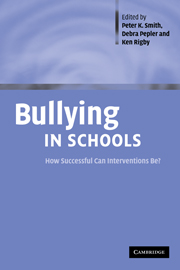Book contents
- Frontmatter
- Contents
- List of figures
- List of tables
- Notes on contributors
- Preface
- 1 Working to prevent school bullying: key issues
- 2 The Olweus Bullying Prevention Programme: design and implementation issues and a new national initiative in Norway
- 3 Is the direct approach to reducing bullying always the best?
- 4 Implementation of the Olweus Bullying Prevention programme in the Southeastern United States
- 5 Prevention of bullying in German schools: an evaluation of an anti-bullying approach
- 6 England: the Sheffield project
- 7 Making a difference in bullying: evaluation of a systemic school-based programme in Canada
- 8 Interventions against bullying in Flemish Schools: programme development and evaluation
- 9 SAVE model: an anti-bullying intervention in Spain
- 10 Australia: the Friendly Schools project
- 11 The Expect Respect project: preventing bullying and sexual harassment in US elementary schools
- 12 A follow-up survey of anti-bullying interventions in the comprehensive schools of Kempele in 1990–98
- 13 Targeting the group as a whole: the Finnish anti-bullying intervention
- 14 Ireland: the Donegal Primary Schools' anti-bullying project
- 15 Bernese programme against victimisation in kindergarten and elementary school
- 16 Looking back and looking forward: implications for making interventions work effectively
- Author index
- Subject index
- References
15 - Bernese programme against victimisation in kindergarten and elementary school
Published online by Cambridge University Press: 02 December 2009
- Frontmatter
- Contents
- List of figures
- List of tables
- Notes on contributors
- Preface
- 1 Working to prevent school bullying: key issues
- 2 The Olweus Bullying Prevention Programme: design and implementation issues and a new national initiative in Norway
- 3 Is the direct approach to reducing bullying always the best?
- 4 Implementation of the Olweus Bullying Prevention programme in the Southeastern United States
- 5 Prevention of bullying in German schools: an evaluation of an anti-bullying approach
- 6 England: the Sheffield project
- 7 Making a difference in bullying: evaluation of a systemic school-based programme in Canada
- 8 Interventions against bullying in Flemish Schools: programme development and evaluation
- 9 SAVE model: an anti-bullying intervention in Spain
- 10 Australia: the Friendly Schools project
- 11 The Expect Respect project: preventing bullying and sexual harassment in US elementary schools
- 12 A follow-up survey of anti-bullying interventions in the comprehensive schools of Kempele in 1990–98
- 13 Targeting the group as a whole: the Finnish anti-bullying intervention
- 14 Ireland: the Donegal Primary Schools' anti-bullying project
- 15 Bernese programme against victimisation in kindergarten and elementary school
- 16 Looking back and looking forward: implications for making interventions work effectively
- Author index
- Subject index
- References
Summary
Impetus for the intervention, early stages of planning, and funding
Despite the growing interest in victimisation problems in school (see Smith et al., 1999), studies that have addressed this issue in the pre-school years are extremely rare. The existence of victimisation in pre-school children, however, had been systematically studied and demonstrated in earlier studies: in day-care centres in Norway (Alsaker, 1993a, 1993b); in the United States with kindergarten children (Kochenderfer and Ladd, 1996); and in kindergarten in Switzerland (Alsaker, 2003; Alsaker and Valkanover, 2001). All three studies showed that the extent to which victimisation occurs in the early childhood years is comparable with that in grade school and that it has an immensely stressful effect on young children.
Studies from Australia (Slee and Rigby, 1993), Finland (Lagerspetz, Björkqvist, Berts, and King, 1982), Ireland (Neary and Joseph, 1994), the United Kingdom (Boulton and Smith, 1994), Norway (Alsaker and Olweus, 2002; Olweus, 1993), Sweden (Olweus, 1978), and Switzerland (Alsaker, 2003) have all shown detrimental effects of victimisation on self-esteem. Repeated victimisation experiences may elicit intense emotional experiences, including feelings of helplessness, worthlessness, and shame. In addition, they may result in highly stable negative expectations for peer relationships and negative self-evaluations, even after the victimisation has stopped (Alsaker and Olweus, 2002; Olweus, 1991). Such negative perceptions of self and peers may, in turn, influence the child's behaviour in school, thus making him or her more vulnerable to victimisation. Therefore, it is important that prevention of victimisation starts in pre-school contexts.
- Type
- Chapter
- Information
- Bullying in SchoolsHow Successful Can Interventions Be?, pp. 289 - 306Publisher: Cambridge University PressPrint publication year: 2004
References
- 27
- Cited by



